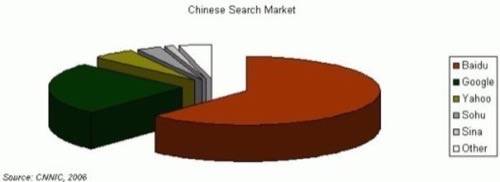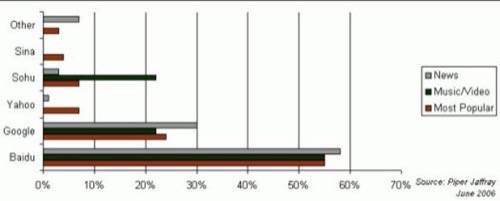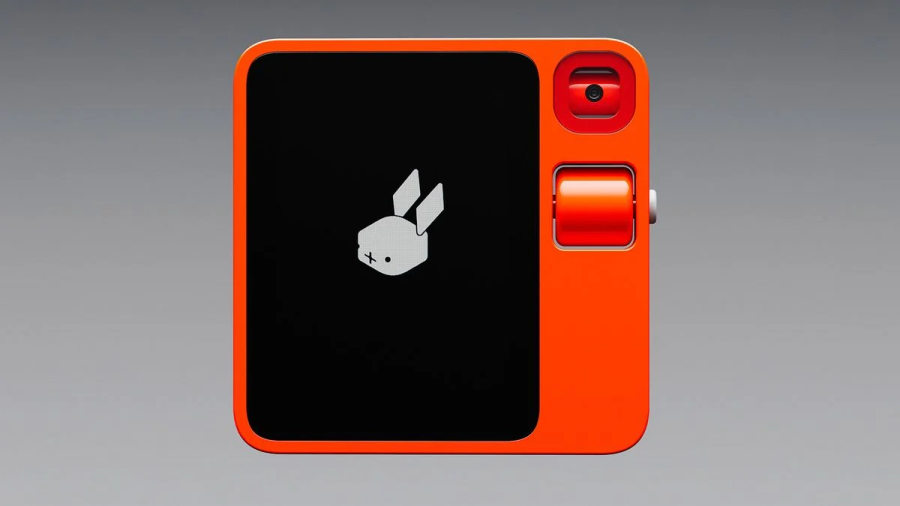Written by Aydin Senkut, an ex-Google senior manager who is currently an angel investor for his company Felicis Ventures. During Aydin’s 6 years with Google, he managed their international expansion – including launching Google’s first 10 international sites.
Today China boasts over 105 million Internet users, not to mention 350M mobile users (growing by 57 million every year). By 2010, Chinese Internet users will outnumber US Internet users by 25%. Currently, 87% of the Chinese Internet audience uses search. And given Internet searchÄôs dominance of monetization and audience rankings globally, the competition for the top spot in the Chinese search market is pretty intense.
Baidu, Google, Yahoo, Sohu and Sina are battling each other to be the leading provider of search in China. Currently the two largest search players, Baidu and Google, account for almost 90% of the searches (source: CNNIC Search Survey, 2006), per the latest local search market share depicted in the pie chart below.
Chinese Search Market

Though it doesnÄôt show up in the main search rankings, Tencent – the leading Chinese Instant Messaging (IM) platform with over 220M active users – has been making significant in-roads into this market by licensing GoogleÄôs search in 2005.
More than 3 out of every 4 Internet searchers in China use multiple search engines (source: CNNIC Search Survey, 2006). Therein lies one of the more interesting dynamics of this market: Baidu and Google clearly lead the field in all aspects of search, through the variety of searches they offer and the quality of their results. Sohu features more prominently in MP3 and video search, compared to its lagging ranking in web search. Yahoo, on the other hand, has been struggling with its local partnering strategy – as it failed to take advantage of large acquisitions locally, including 3721 and the much publicized Ali Baba. Indeed Yahoo’s brand seems weaker in China compared to GoogleÄôs and other local players – as a result of its lack of focus (and differentiation).
Search Type

Google progressing in China
Even though Google is trailing Baidu in market share, it has made some significant progress in the last 2 years in China. It started to comply with local laws in China by filtering its results (and itÄôs the only one that informs users when it does so). Google also introduced its first music search – though its results point to music sites and not to downloadable music links, like its competitors.
Google recently managed to outflank Baidu in terms of perceived quality. Recent research by Keynote Systems shows that among 1200 Internet users in China, Google outperformed all other competitors in 11 out of 13 factors measured. Moreover, most participants that ranked Google highest were actually using another search engine as their primary site for search. GoogleÄôs excellent scores were not surprising, given that the 3 most important criteria for ranking search engines in users minds were: clean home page design, quality of web search results, and quality of image search results (all of which play strongly to GoogleÄôs hand). This trend speaks strongly for Google in terms of catching up to Baidu in the market share.
However, Äúboth Google and Yahoo could still further improve their government relations in ChinaÄ?, quipped Janelle Wu, who was formerly Senior VP at NetEase.
Baidu, the market leader
Janelle Wu also mentioned that one of BaiduÄôs great strategic moves was hiring R&D experts from the US, while recruiting locally for sales talent.
Baidu is currently enjoying virtually double the market share in all types of search over Google. A 2006 Study by CNNIC cites other reasons for Baidu attracting a large user base, including BaiduÄôs well-liked Bulletin Boards and its responsiveness. Baidu also benefits from its wildly popular MP3 search, which takes users directly to downloadable music. This could be a major headache for Baidu in the future if China decides to tighten its enforcement of IP laws, with respect to illegal music.
Sohu, Sina and Yahoo all draw significant numbers of users to their search sites through their popular free email offerings, but thatÄôs still not enough to help them break into the upper echelon of search – currently occupied by Baidu and Google.
In terms of brand awareness, Baidu once again stands out with 87% – while Google and Yahoo trail with 64% and 39% respectively (source: CNNIC Search Survey, 2006).
Furthermore, more than 50% of BaiduÄôs users are under 23 years old. Since 80% of people under 24 years old use the Internet in China (source: the CASS China Internet Survey, 2006) compared to a much lower ratio for older age groups, BaiduÄôs momentum is bound to continue. Maybe itÄôs for this reason, and lack of further explosive growth opportunity at home, that Baidu decided to launch its first international search in Japan last week.
The future of the China search market
While GoogleÄôs perception has improved considerably among Internet users in China, its refusal to offer its Gmail and Blogger services locally (due to privacy concerns) will probably slow its efforts to boost its user base. However Google continues to invest in the Chinese Internet market, with a minority stake in P2P player Xunlei – which is aimed at the local online video market. This move might have other benefits for Google, as Xunlei doesnÄôt support Baidu downloads for instance.
Among all the players, the one to watch is Tencent. Given its dominance in IM and success in entering new markets such as casual games, mobile chat and virtual goods – it has the strengths to make a decent entry into the Chinese search market.
The Chinese search market is bound to hold a few surprises in the next year or two, as most Chinese Internet users claim that factors such as duplication of results, freshness and quality of the way results are ranked, could use further improvement.
Speaking of improvement, Google apparently needs to pay more attention to the quality of its image search, as it returns virtually no images for the Chinese name of former president Deng Xiaoping. Baidu, on the other hand, could be leveraging its new Japanese office to offer a better service to its users searching for adult terms like ÄúsexÄ?. Baidu apparently returns only 3 results for ÄúsexÄ? in its Chinese site, whereas its new Japanese site returns 107,000 images for the same search term.









